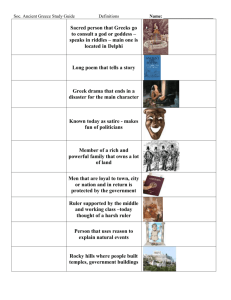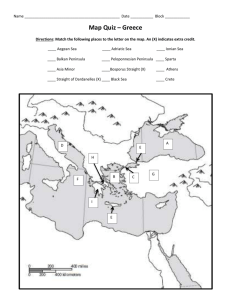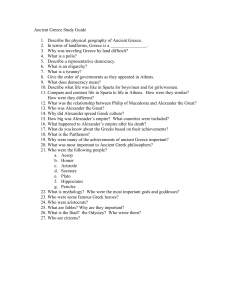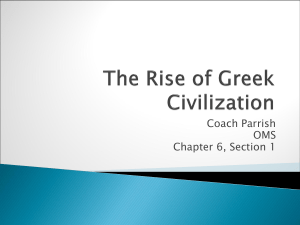Chapter 6
advertisement
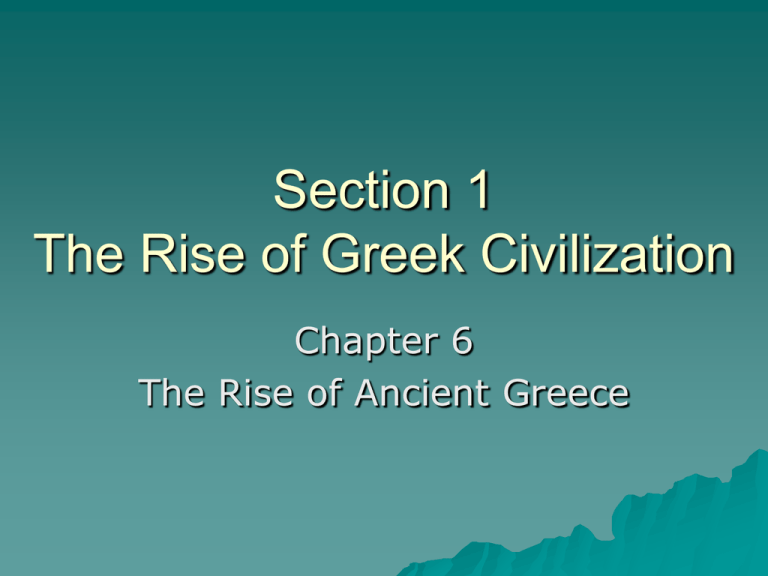
Section 1 The Rise of Greek Civilization Chapter 6 The Rise of Ancient Greece The Parthenon in Athens Objectives Understand how Greece’s geographic setting influenced the development of Greek Civilization. Examine Examine early Greek history. the development of democracy in Greece. Temple of Didyma Key Terms peninsula an area of land nearly surrounded by water epic - a long poem that tells a story acropolis - a high, rocky hill where early people built cities city-state a city with its own traditions, government, and laws; both a city and a separate independent state. aristocrat a member of a rich and powerful family tyrant a ruler who takes power with the support of the middle and working classes democracy - a form of government in which citizens govern themselves Where is Greece? Greece’s Geographic Setting Greece is a country made up of peninsulas. No part of Greece is far from the sea. Mountains are the major land forms of Greece. About 1/5th of Greece is good for growing crops. Greeks became traders and sailors. Some of them lived on actual islands almost totally surrounded by water. Others lived on land islands where mountains separated these small communities from each other. The geography in Greece made it difficult for people from different communities to get together. Each Greek community thought of themselves as their own separate country with their own customs and beliefs. They were ready to go to war with each other to protect themselves. Reading Check What do we mean when we say the ancient Greeks were all islanders? Some Greeks lived on actual islands. Others lived on land islands, or peninsulas, that were surrounded by water on all sides but the one that connected it to the land. These peninsulas gave the people the same feeling of being surrounded by water as the islands did. Greek Beginnings Minoan Civilization Greek Beginnings – Minoan Civilization Earned trade power through Discovery Crete Streaming: Greek Beginnings Minoan Civilization The Bronze Age from about 3000 to about 1100 B.C. is when they lived on Crete. Crete is located in the Aegean and Mediterranean Seas which allowed for trade with mainland Greece, other Greek islands, Egypt and Sicily. Archeological finds show that the Minoans had developed a vibrant culture which found writings on clay tablets. A palace in Knossos was covered with fanciful wall paintings and statues of goddesses. The middle of 1400 B.C. it is believed the Mycenaeans invaded Crete. The Mycenaeans Mainland Greece – home of Mycenaean culture Height of power around 1400 BC Earned power through conquest The Trojan War A Greek myth tells of the Greeks conquering Troy by using a Trojan Horse. They hid inside of a huge wooden horse and when the Trojans brought it into their city the Greeks climbed out and defeated the Trojans. The Iliad and the Odyssey are two epic poems believed to be written by Homer which tells about the Greek gods and their heroes. Most historians agree that the Trojan War did not happen exactly as Homer described it. Troy was destroyed by a large fire in the mid-1200 B.C. Reading Check Page 171 Contrast how Minoans and Mycenaeans spread their power. Minoans gained their power through trade, while Mycenaeans gained it through conquest. The Dark Ages of Greece Poverty was everywhere; people no longer traded for food and other goods. They had to depend on what they raised by themselves and forgot the art of writing. These years, from the early 1100s B.C. to about 750 B.C., have been called Greece’s Dark Ages. Old traditions were remembered only in the myths that were told and retold. Families gradually began to resettle in places where they could grow crops and raise animals. They built structures to protect them from attack on fortified hills called an acropolis. Eventually, It they began writing again. was during this period that Homer is believed to have composed his epic about the Trojan War. Reading Check What happened during Greece’s Dark Ages? The people who remained in Greece during the Dark Ages became more isolated and poor and concentrated on survival. Writing was lost and traditions and history were passed down only by word of mouth. Many people relocated to be able to farm and eventually began to create villages from farms. Democracy in Greece City-States Develop Around 750 B.C. city-states started to develop; they included a city, surrounding villages, and farms. Each one grew into its own independent state. Athens – Capital of Greece Aristocracy: Nobles Rule Eventually, after the Dark Ages, they were ruled by aristocrats, from rich and powerful families, who owned most of the good lands and could afford horses, chariots, and the best weapons. A New Type of Ruler As the middle class of merchants and artisans developed, they wanted more say in the government. They were able to afford weapons and started to grow in strength. Due to these changes, aristocratic governments were often overthrown and replaced with tyrants supported by the middle and working classes. Today, we think of tyrants as being cruel and violent, but most Greek tyrants were wise and just. Athenian Acropolis Reading Check What kind of ruler often replaced aristocratic governments? Tyrants often replaced aristocratic governments. Discovery Streaming Video: The Democracy of Athens City-States Develop Around form 750 BC, city-states began to – City-state: an independent state made up of several villages grouped together – There were hundreds of Greek citystates Respond: What are the advantages and disadvantages of having many smaller independent states, as opposed to one large central Democracy in Greece Some city-states adopted a new form of government Democracy: government where citizens govern themselves Athens was the best example of a city-state democracy Solon – Athenian leader whose laws reformed economy and government of Athens Freed anyone who was enslaved for having debts and cancelled debts Allowed any male citizen of Athens aged 18 or older to debate laws Restrictions –Only 1 in 5 Athenians was a citizen (had to have Athenian mother and father) –Women and non-citizen men did not take part in democracy Discovery Streaming Video: The Democracy of Athens https://www.youtube.com/watch?v= Xtn-BZH_xU0 Reading Check Why did some Athenians benefit more from democracy than others? Democracy did not apply to enslaved people, women, and foreigners.


